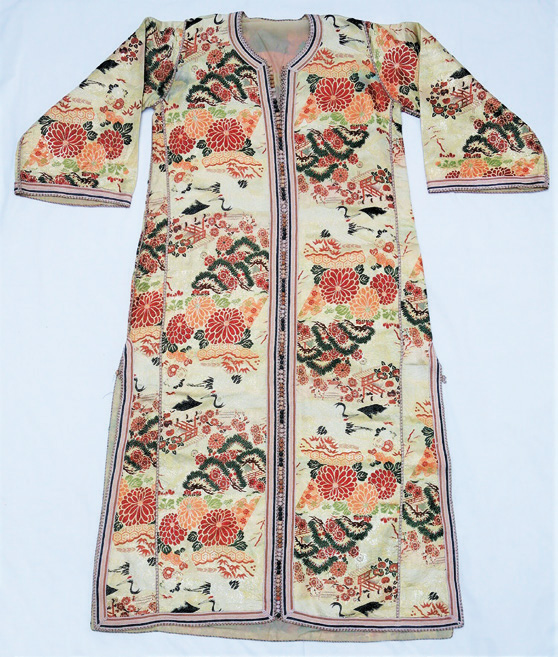Textiles on the Move. An online meeting
From 6-9 October, IIAS organised an online conference entitled 'Textiles on the Move'. Not only could the conference be attended by people from all over the world, but we are now also able to share the digital recordings with you on our website. These will be publically available until 15 November 2020.
A (minor) victim of the COVID-19 pandemic was the IIAS conference ‘Textiles in Motion & Transit’, which had been planned to take place in Leiden in October 2020 and was organised together with the Tracing Patterns Foundation in Berkeley, California, and the Textile Research Centre (TRC) in Leiden. A Call for Papers had been circulated, some 80 lecturers from all over the world (from a total of more than 200) had been selected and invited, and a fringe programme of workshops, displays and demonstrations had been set up. Unfortunately, it all had to be postponed, probably until the middle of next year.
We subsequently decided to organise an online conference, on the same theme and around the same time, with some of the confirmed speakers. We did so in close collaboration with the Textile Museum in Washington, D.C., and using the advantage of an online event, we opened participation to anyone interested, worldwide. To share even more broadly, we also decided to make the recorded online sessions available via our website as soon as possible after the conference.
The theme and title of the virtual conference was ‘Textiles on the Move’. The programme focused on the role of textiles beyond their primary function, namely to provide warmth and protection. Textiles and clothing also speak volumes about the hierarchy of power relations among their users, and they may act as repositories of spiritual power that can be tapped into by following the correct rituals and prescriptions. These meanings and values of textiles are culture-specific, often unspoken, but fully understood within a given tradition. Due to their portability, however, textiles regularly move to and pass through foreign places. On these journeys and in their new environments, they often lose their original values, acquire new significance, and/or communicate altered messages.
The ‘textiles on the move’ concept was used to explore the lives of textiles—their displacements and transformations—within the Asia-Pacific region as well as between this region and the rest of the world. During the conference, scholars investigated the materiality, the making, and the use and reuse of textiles outside the context of their original cultures. In broad terms, they looked into the agents that facilitate textile movements, the forces that contribute to accumulating new meanings, and the circumstances that allow these transformations to take place. One entry point of discussion was the global trade network that resulted in so many cultural exchanges, as in the case of the trade between South Asia and Europe from the sixteenth century onwards, but also in Asia itself, between Indonesia and India. Fascinating in this respect is the spread of the (in)famous buteh motif from Iran and India, which in the West became known as the Paisley motif, named after the Scottish town with the same name. The same motif can now be found in Indonesia, but also on men’s underwear from America and women’s wrap-arounds from Zanzibar.
The programme of the virtual conference included a series of different contributions, including a roundtable discussion, two video recordings, various brief presentations on a plethora of subjects, and even a recorded guided tour of a museum exhibition on the kimono, in London’s Victoria & Albert Museum. In almost all cases, people could join in and discuss the subject of the talk with the speaker(s). The conference also included two key-note speakers, namely Sumru Belger Krody of the George Washington University Museum and The Textile Museum (Washington, D.C.) and Dale Carolyn Gluckman, former Head of Costumes and Textiles of the Los Angeles County Museum of Art, and former senior consultant to the Queen Sirikit Museum of Textiles in Bangkok.

Morrocan/Japanese women’s kaftan; collection Textile Research Centre Leiden.
Please feel welcome to switch on the recorded sessions of the four-day online event, and enjoy listening to a roundtable discussion on new directions in Silk Road studies (with Zhao Feng, Director of the China National Silk Museum, Hangzhou), or a lecture on Javanese textiles in the Thailand court, or a talk on prayer rugs and their changing meanings. Another subject that was covered is the production of a seventeenth-century nightgown produced in India and its context within the broad global trade network between East and South Asia, and Europe. Or, you may be interested in the development of specific textiles in the French Provence that are based on seventeenth and eighteenth-century Indian chintzes. And what about a video of the production of kantha covers in northeastern India, or a talk with the title ‘Textiles with two parents’, about cloths that combine two completely different traditions, such as a Moroccan wedding curtain embroidered in chikan work from Indian Lucknow? These are just a few examples. The world of textiles is indeed highly fascinating and reflects many aspects of human life and the worldwide interaction between users and producers.
The online conference was attended each day by some 150 participants, and the general appreciation of the varied and lively presentations augur well for future online conferences. IIAS and its partners, in the face of future travel restrictions, were fortunate of having the opportunity to learn enormously from this conference. Its formula of an interactive programme with relatively brief items, a moderator for the day, and the possibility for participants to ask questions, offers hope and inspiration for future events.
Information
The recorded sessions will be available to watch until 15 November. www.iias.asia/events/textiles-move
The convenors
Sandra Sardjono, Director Tracing Patterns Foundation, Berkeley
Gillian Vogelsang-Eastwood, Director Textile Research Centre, Leiden
Christopher Buckley, Wolfson College, Oxford
Willem Vogelsang, Deputy Director at the International Institute for Asian Studies, Leiden